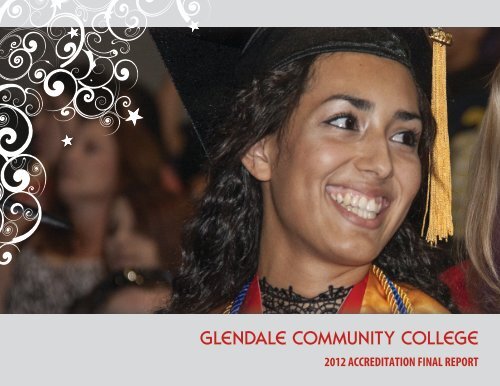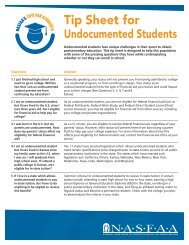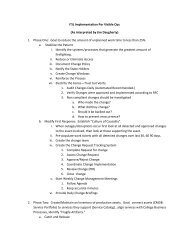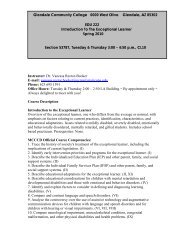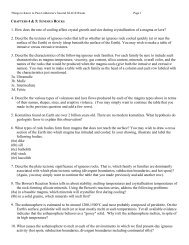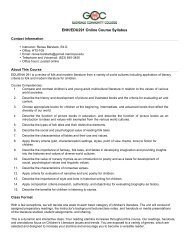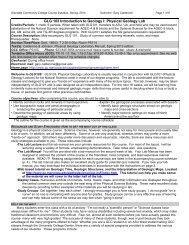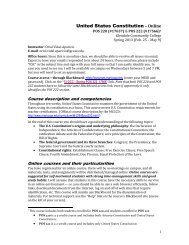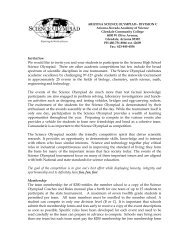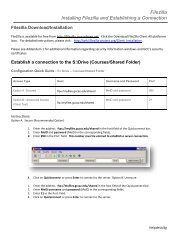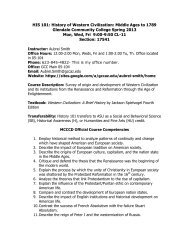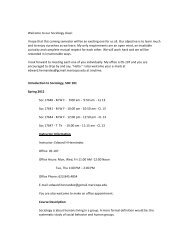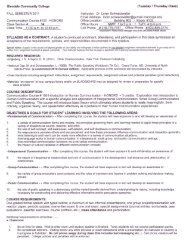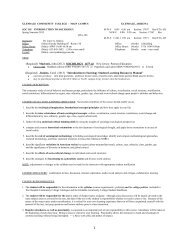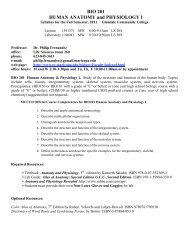final report from HLC - Glendale Community College
final report from HLC - Glendale Community College
final report from HLC - Glendale Community College
You also want an ePaper? Increase the reach of your titles
YUMPU automatically turns print PDFs into web optimized ePapers that Google loves.
July 16, 2012President Irene H. KovalaMaricopa <strong>Community</strong> <strong>College</strong>s-<strong>Glendale</strong> <strong>Community</strong> <strong>College</strong>6000 W. Olive Ave.<strong>Glendale</strong>, AZ 85302Dear President Kovala:This letter is formal notification of the action taken concerning Maricopa <strong>Community</strong> <strong>College</strong>s-<strong>Glendale</strong> <strong>Community</strong> <strong>College</strong> by the Higher Learning Commission. At its meeting on July 16, 2012, theInstitutional Actions Council (IAC) voted on the items below. This letter serves as the official record ofthis action, and the date of this action constitutes the effective date of your new status with theCommission.Action. The IAC voted to continue the accreditation of Maricopa <strong>Community</strong> <strong>College</strong>s-<strong>Glendale</strong><strong>Community</strong> <strong>College</strong> with the next comprehensive evaluation to be set in 2021-22.If the current Commission action includes changes to your institution’s Statement of AffiliationStatus (SAS) or Organizational Profile (OP), the changes will appear in these documents on theCommission’s Web site by August 3, 2012. The SAS is a summary of your institution’s ongoingrelationship with the Commission. The OP is generated <strong>from</strong> data you provided in your most recentInstitutional Update.If you have questions about these documents after viewing them, please contact Robert R.Appleson, your staff liaison. Information about notifying the public of this action is found in Chapter 8.3-3 and 8.3-4 of the Handbook of Accreditation, Third Edition.Please be aware of Commission policy on planned or proposed institutional changes that requireCommission action before their initiation. You will find the Commission’s change policy atncahlc.org/information-for-institutions/institutional-change.html. If you have questions about howplanned institutional changes might affect your relationship with the Commission, please write or callRobert R. Appleson.On behalf of the Board of Trustees, I thank you and your associates for your cooperation.Sincerely,Sylvia ManningPresident
G. Principal Documents, Materials, and WebPages ReviewedAdditional materials• “AACHE Statement on Academic Vision for the Maricopa<strong>College</strong>s” by the Scottsdale <strong>Community</strong> <strong>College</strong>, MCCCDDistrict (2006)• “Hispanic Serving Institution Definition,’ HispanicAssociation of <strong>College</strong>s and Universities (HACU)webpage: http://www.hacu.net/hacu/HSI_Definition.asp. Last accessed April 2012.• 2011 HACU Hispanic Service Institution (HSI) members(31 Dec 2011)• AACHE Statement on Academic Vision for Maricopa<strong>College</strong>s (14 Feb 2006)• ACRL Statistics 2010 Worksheet – GCC response• <strong>College</strong>-Wide Academic Achievement Committee2010-11 After Action Report and Process Manual• Dr. Kovala’s video, http://GAZAA.gc.maricopa.edu/media/lmc/positionA2.wmv• eCourse Readiness Survey• Faculty email, 1 Mar 2012• Faculty email, 1 Mar 2012 and 5 Aug 2010• Faculty email, 10 Apr 2012• Faculty email, 16 Apr 2012 ~ 10-11 Jun 2002• Faculty email, 26 Jan 2012• Faculty email, 5-6 Apr 2012• GCC Capital Allo One-time budget allocations 1995-2012• GCC <strong>College</strong>-Wide Academic Achievement 2010-11Macro• GCC eCourses strategic plan 2009-2012• GCC Hispanic-Serving Institution, Action Plan• CC Honors Course proposal form• GCC Honors Program brochure• GCC Honors Program FY12 list of courses• GCC Honors Program honors assessment data sheet• GCC Library summary of concerns• GCC North organizational chart• GCC organizational chart 2011-12• <strong>Glendale</strong> <strong>Community</strong> <strong>College</strong> Master Plan 2003-2023• http://shawvalenza.com/publications.php?id=273• MCCCD District Libraries Council Strategic Plan 2008-2001• MCCCD District provided Ratio of Residential to AdjunctFaculty 2002-2011)• MCCCD Preliminary Employment Review & DraftFaculty ecruitment Plan by Bruna Pedrini Proposed GCCOrganizational Structure DRAFT• Strategic Accomplishents 2003-2010• Trend Data (5 yrs) frm National <strong>Community</strong> <strong>College</strong>Benchmark Project• www.gccaz.edu/ecourses• <strong>College</strong> Research Services Student Data• Monitoring Report on Student Outcomes Assessment• Northern Arizona University, <strong>Glendale</strong> Campus• Progress Report on Campus Climate• Progress Report on Strategic Planning• Report of a Requested Focused Visit for Change• Title 3 and 5: Application for Designation as an EligibleInstitution• ACE Plus (Achieving a <strong>College</strong> Education Plus)• Arizona General Education Curriculum (AGED) – MCCCDCourse List• Assessment of Technology Literacy 2009-2009• ASU-Maricopa Alliance• Center for Leaning website• Climate Survey Results 2001, 2005, 2008• <strong>College</strong> Research Services Student Data• <strong>College</strong> Research Services CWAAC Archive• <strong>College</strong>-wide Academic Achievement Committee• Core Principles, Standards of Conduct, Assumptions,and Informal Conflict• Resolution Process• Course Level Assessment Site• Disability Services and Resources• FIPP and MFI Program Summary• GCC <strong>College</strong> Research Services• GCC General Catalog & Student Handbook• GCC North –Institutional Change Request• GCC Strategic Plan/GCC Planning Information• In the Loop• Maricopa ASU Pathways Program• Maricopa Faculty in Progress Program• Maricopa Faculty Internship Program• Monitoring Report on Student Outcomes Assessment• Multicultural Affairs Program• Project SAILS Report 2005, 2009• Public Safety• Residential Faculty Policies• Standardized Assessment of Information LiteracyReport• Strategic Plan 2005-2008, 2010-2013• Student Affairs Strategic Plan• Transfer Credit Policy• Adapted Fitness Center• Adjunct Faculty Board Policies• AZ Legislature: General Powers and Duties of DistrictGoverning Boards• Bylaws PSA• <strong>College</strong> Plan• Crafts Policies (employee group policy manual)• Instructional Grievance Process• Library and Media Services Home Page• Management, Administrative, and TechnologicalOrganization• Maricopa CC District Governing Board-A Citizen’s Guide• Maricopa Faculty Internship Program• Maricopa Governing Board7 Final Report: Assurance Section
• MCCCD Office of Equity, Opportunity, and Engagement• Multicultural Affairs Program• Non-Instructional Complaint Resolution Process• Policies Professional Staff• Public Safety Policies• Public Stewardship: Online Policy Manual• Sexual Harassment Policy• Scholastic Standards <strong>from</strong> Public Stewardship OnlinePolicy• Specialty Funded Program Policy• Transfer Credit Policy• Veterans Services• Business Services Strategic Plan 2008-2014• <strong>College</strong> Advancement Services Strategic Plan 2008-2015• Human Resources Strategic Plan 2008-2014• Information Technology Strategic Plan 2007-2012• Maintenance & Operations Strategic Plan 2008-2010• Maricopa Emergency Management System• Master Plan – GCC North (2006-2044)• Master Plan 2003-2023• Master Planning Updates• My Maricopa.edu• Planning for the Future• Reuse of Old Space List• Strategic Accomplishments• Student Affairs Strategic Plan• Assessment of Technology Literacy 2008-2009• ASU-Maricopa Alliance• Center for Learning website• Center for Teaching Learning and Engagement• <strong>College</strong>-wide Academic Achievement Committee• Course Level Assessment• Disability Services and Resources• eCourse Readiness Survey• eCourses GCC Gold Standard• EDU 250 Teaching and Learning in the <strong>Community</strong> <strong>College</strong>• Faculty Development Website• Faculty Minimum Qualification8 • Final GCC Report: eCourses Assurance Section• GCC Elements Newsletter• Monitoring Report of Student Outcomes Assessment• Standardized Assessment of Information Literacy Report• Writing Center – Face-to-Face and Electronic• Arizona General Education Curriculum (AGEC) – A, B, S(MCCCD) 2011-12• AZ Transfer• CCTA Suggested Criteria• Center for Curriculum & Transfer Articulation• Copyright Guidelines• Course Equivalency Guide• Creative Pathways (MCCCD Human Resources)• Disciplinary Standards and Student Conduct Code• Diversity Infusion Program• Employee Kudos – Gaucho Gazette• Institutional Review Board Handbook• Instructional Grievance Process• Leadership Advancement Program• Leadership Advance Program (MCCCD Human Resources)• Library and Media Services Home Page• MCCCD Employee and Organization Learning Team• MCLI Program for Faculty Professional Growth• MLA Documentation Guidelines• National <strong>Community</strong> <strong>College</strong> Benchmark Project (NCCBP)Trends• Renewal Initiative Program (MCCCD Human Resources)• Transfer Credit Policy• Wellness Maricopa• Women’s Leadership Group Mentor Program• ASG Offices and Lounge Committee Report• ASG Proposed Changes for Student Union Remodel• ASU-Maricopa Alliance• <strong>Community</strong> <strong>College</strong> Survey of Student Engagement• Concurrent Enrollment (CEP) – Nursing• GCC <strong>Community</strong> Survey• GCC Memberships• Graduate Survey• Head Start – Catholic Charities <strong>Community</strong> ServicesWestside -2010 Report• INSTITUTE – Abraxis Testimonial• INSTITUTE – Southwest Gas Testimonial• Law Enforcement Training Academy• Maricopa ASU Pathways Program• Noel-Levitz Student Satisfaction Inventory-Summary2010• SLICE 2010 Students’ Before & After Comments• Survey of Entering Student Engagement (SENSE) 2011Findings• Chancellor’s Executive Council• Management, Administrative, and TechnologicalOrganization (employee group policy manual)• Policies: Professional Staff (employee policy manual)• Specialty Funded Program Policy• Courses Offered in Non-Standard Terms/CompressedForman• Credit Hour Explanation• Credit Hour Worksheet• Definitions of Credits/Periods/Load (MCCCD)• Fall 2011 Course Schedule• Revised Definition of Credit Hour (Proposed)• Spring 2011 Course Schedule• Summer 2011 Course Schedule
II. COMMITMENT TO PEER REVIEWA. Comprehensiveness of the Self-Study ProcessThe Self-study process began in spring 2009. Volunteers came <strong>from</strong> all employee groups. There were eight sub-committees consistingof the five criterions plus committees on communications, hospitality, operational indicators, and the resource room. The criterioncommittees began gathering evidence in 2009-10. The 2010 convocation provided a means for communicating about the process andentitled, “CSI, the <strong>College</strong> Gathers Evidence”.The first comprehensive draft of the self-study was completed in June of 2011, which coincided with the retirement of President Green.The new president Kovala requested <strong>HLC</strong> postpone the originally scheduled visit for February 2012. In November 2011, all self-studycommittee members met with Dr. Breslin, staff liaison, to discuss the process. The <strong>final</strong> draft was submitted to <strong>HLC</strong> in February 2012.B. Integrity of the Self-Study ReportMembers of the team believe that the self study presents an accurate picture of <strong>Glendale</strong> <strong>Community</strong> <strong>College</strong>.C. Adequacy of Progress in Addressing Previously Identified ChallengesIn its last comprehensive <strong>report</strong> in 2002, the commission identified issues related to diversity, college climate, assessment, and strategicplanning. Changes have been instituted that embrace new initiatives in plans, in concert with the chancellors program “One Maricopa”.D. Notification of Evaluation Visit and Solicitation of Third-Party CommentRequirements were fulfilled.III. COMPLIANCE WITH FEDERAL REQUIREMENTS1The team examined documents regarding compliance with federal requirements for credit, tuition fees, institutional records of studentcomplaints, transfer of credits, verification of student identity, Title IV program and related responsibilities, institutional disclosures andadvertising/recruitment materials, relationships with other accrediting agencies and with state regulatory bodies, notification of thecomprehensive visit, and third party comments. The team found the college to be in compliance with these requirements.IV. FULFILLMENT OF THE CRITERIACRITERION ONE: MISSION AND INTEGRITY. The organization operates with integrity to ensure the fulfillment of its mission throughstructures and processes that involve the board, administration, faculty, staff, and students.1. Evidence that Core Components are metThere is strong awareness and understanding of the college’s revised mission and vision statements. The mission and vision statementsare posted prominently throughout the college’s buildings and are also provided on the college’s website in the “About the <strong>College</strong>”section. Most employees indicated their awareness and knowledge of the revised mission and vision statements when asked about themat various meetings with the <strong>HLC</strong> team members.9 Final Report: Assurance Section
The Governing Board of the Maricopa <strong>Community</strong> <strong>College</strong> District is knowledgeable about and supportive of the students, employees,programs and services provided at <strong>Glendale</strong> <strong>Community</strong> <strong>College</strong>. The Board is committed to policy governance and has completedextensive training to better understand and practice policy governance strategies.Although the interactions between the Maricopa <strong>Community</strong> <strong>College</strong> District operations and the college are oftentimes complex, theworking relationships between the two entities are effective and productive. Examples were cited of increased collaboration among theDistrict and the colleges in the areas of marketing and fund-raising. However, frustration was expressed regarding the amount oftime needed to hire faculty and staff and the perceived lack of information regarding human resource practices and procedures.<strong>Glendale</strong> <strong>Community</strong> <strong>College</strong> has a strong history of shared governance across various employee groups and constituencies. Thefollowing groups were identified as being highly involved in various aspects of leadership at the college: the Executive Leadership Team,Administrative Team, Faculty Senate, Academic Departments, Department Chair Council, Employee and Constituency Groups (15) and 46standing and ad hoc committees. In team visits with the various groups and teams,e mployees verified that they were providing input andrecommendations regarding a wide variety of college operations and activities.The college embraces its diverse student composition and has developed programs and services to support unique student populations.Examples of these programs and services are the Multicultural Affairs program, the Adapted Fitness program, the ACE Plus program,its International Education program and its programs for veterans. The college also recognizes the age diversity of its students and iscommitted to providing learning that addresses the different learning styles and values that are associated with students of varyinggenerations.2. Evidence that one or more specified Core Components need organizational attentionIn regards to Core Component 1B, the college has achieved great ethnic diversity in its learners and is struggling to match this diversity inits employees, and especially in the faculty ranks. As of 2011, about 20% of the faculty was identified as being in a minority population,compared to over 40% of all students. The college is aware of this concern and is taking steps to hire a more diverse faculty and staff.3. Evidence that one or more specified Core Components require Commission follow-upNone.4. Evidence that one or more specified Core Components are not met and require Commission follow-upNone.Recommendation of the TeamCriterion met. No Commission follow-up required.10 Final Report: Assurance Section
2CRITERION TWO: PREPARING FOR THE FUTURE. The organization's allocation of resources and its processes for evaluation andplanning demonstrate its capacity to fulfill its mission, improve the quality of its education, and respond to future challenges andopportunities.1. Evidence that Core Components are metThe team determined that GCC has adequate resources to support its Mission and is poised to meet future needs. GCC’s Honors Program andCTLE Program are examples of faculty-driven programs that maintain profound vetting processes to enhance the quality of the curriculumand student life through salient standards and engaging professional development opportunities. GCC’s department and program levelstrategic planning processes are exemplary and can add value to the <strong>College</strong>’s strategic planning effort. Notable are the strategic plansused by the HonorsProgram, CTLE Program, and the MCCCD District Libraries plans. GCC main and GCC North facilities were state of the art and wellmaintained. The college has a facilities master plan for the main campus and the north campus. Phase I of both master plans are alignedwith the 2004 capital bond issues. The facilities, and the programs they support, demonstrate the college’s commitment to serving theirstudents and community. The team took special note of the Public Safety Sciences building, the Life sciences building, the Library and thestudent technology lab in High Tech 1 building. Since 2001, four buildings have received awards of excellence in the annual Valley Forwardand Best of the West competitions. These competitions recognize excellence in facilities design, sustainability and the environment,educational programs and leadership and services improving each citizen’s way of life in the Phoenix Metropolitan Area.GCC has a robust budget development process that provides input <strong>from</strong> all areas of the college. New operating budget requests are linkedto the strategic directions and are submitted to the President’s Budget Advisory Committee. Members of the President’s Budget AdvisoryCommittee discuss the budget requests with their employee group and bring their prioritized list to be discussed at the committee level.The President’s Budget Advisory Committee then recommends a prioritized list of requests to the president. Approved budget requests arethen posted on the business services web page. New staffing requests are reviewed by the executive leadership team. While numerouspositions have been held vacant, the executive leadership team has recommended and the president has approved numerous faculty andstaff positions to be filled in FY 2013.GCC must manage a complex financial system that includes many different funding sources with different spending criteria. GCC hasfaced difficult financial challenges with state funding to the district declining to 1% <strong>from</strong> 15% over the last 10 years. GCC relies heavilyon property taxes to support general operations and with a weakened economy and declining property values this may be a challenge.Through a successful giving campaign GCC has increased scholarship funds available (<strong>from</strong> $46,570 in FY 2002 to $2,792,900 in FY 2011)to students to help offset the increase in tuition costs. The college has exhibited prudent financial management by absorbing the budgetreductions, increasing aid to students and maintaining a balanced budget. GCC staff demonstrated professionalism, dedication and a focuson student success. Staff is offered generous and comprehensive professional development benefits.11 Final Report: Assurance Section
2. Evidence that one or more specified Core Components need organizational attentionThe following issues deal with Core Component 2D.The strategic planning process begins with the Maricopa <strong>Community</strong> <strong>College</strong> district governing board setting board goals and strategicdirections for the district. GCC develops their college vision, mission, long term directions (such as campus master plan and institutionaleffectiveness plan), and strategic directions (that mirror the districts strategic directions). The GCC strategic plan and departmentalstrategic plans are then developed. The team noted inconsistency in the development of departmental strategic plans. Some areas of thecollege were routinely evaluating their department’s progress with the plan while other areas were working with a draft departmentalplan <strong>from</strong> 2008.GCC strategic plan does indicate administrative “champions” and notes the amount of funds that are being allocated to each strategicdirection. However, as noted by the strategic planning review committee and the self study, the college has struggled with closing theloop. When new funds are allocated for a specific project <strong>from</strong> the strategic plan, there is no accounting of how the funds were spent andwas the project successful.GCC is in process of reorganizing college research services to the office of strategy, planning and accountability, and transitioning to a newstrategic planning model that will assist the college in making better informed strategic decisions and more effectively manage a campuswide strategic planning process, performing environmental scans, predictive analysis and climate surveys.The district human resources director has been in place for a year and is in process of a revamping its purpose, role statements andguiding principles. Human Resources is moving <strong>from</strong> a policy driven and compliant focus to the strategic priorities of solutions, operations,innovation, strategy, planning, employee and organizational development. Efforts have continued to recruit a morediverse faculty and staff. The new district human resources director is reorganizing staff and functions to reflect new recruiting plans andprocesses that have an intentional focus. The district inclusiveness and communications with individual colleges is essential in order tonavigate new processes and support “One Maricopa”.3. Evidence that one or more specified Core Components require Commission follow-upNone.4. Evidence that one or more specified Core Components are not met and require Commission follow-upNone.Recommendation of the TeamCriterion met. No Commission follow-up required.12 Final Report: Assurance Section
3CRITERION THREE: STUDENT LEARNING AND EFFECTIVE TEACHING.The organization provides evidence of student learning and teaching effectiveness that demonstrates it is fulfilling its educationalmission.1. Evidence that Core Components are metStandardization of the hiring process thru district hiring guidelines insures all applicants receive an equal opportunity forconsideration and only the most qualified applicants are hired. MCCCD has established minimum requirements for faculty positions.The team reviewed hiring processes and practices and determined faculty positions were aligned appropriately.GCC supports the needs of students who are not prepared for college level work through a holistic approach to developmentaleducation. A review of documents in the resource room and interviews with faculty and staff provided evidence that underpreparedstudents receive support through developmental education courses, one-on-one faculty assistance in the Center for Learning,Supplemental Instruction, Peer Tutoring, Learning Communities and Student Success course enrollment.GCC provides the opportunity for faculty to attend the Maricopa Summer Institute for four weeks each year to gain skills andknowledge in strategies for working with underprepared students. Through the support for participation in the Institute, and bycreating a Developmental Education Committee that <strong>report</strong>s to a newly created Dean of Academic Planning, the administrationdemonstrates its commitment to addressing the specific needs of developmental education.Since the 2002, accreditation site visit, GCC demonstrates progress in and commitment to assessment of student learning. The<strong>College</strong>-wide Academic Achievement Committee(CWAAC) and faculty are widely and actively involved in general education andcourse level student outcomes activities.As a result of the Site Team 2002 visit, GCC was asked to complete a monitoring <strong>report</strong> that was submitted to the Higher Learningcommission in 2005. GCC has stated student learning outcomes at primary and secondary levels. The college has an active <strong>College</strong>wideAcademic Achievement Committee (CWAAC) and it is the representative body for general education assessment initiatives.GCC has clearly articulated college level outcomes and conducted annual assessment efforts since 1998. Concerted institutionalefforts to improve assessment practices are documented and are a priority for the institution. GCC currently utilizes the AcademicProfile/ETS-Proficiency Profile to obtain quantitative measures about student learning. The institution had demonstratedcommitment to continue to expand the sample size of college level assessments.GCC has also made progress in assessing secondary college-wide outcomes assessment to address additional skill assessment setsas identified in the Arizona Governing Board Outcome for University Transfer and General Education: communication, computer,and information literacy. Assessment of these outcomes is conducted on a three year rotation.The current Self-Study and Site Team visit recognized that progress has been made at the course level assessment through GCC’sparticipation in the <strong>HLC</strong> Academy Project that began in 2009. Department level coordinators work with residential, adjunct anddual enrollment faculty on course level assessment. However, these efforts are advancing at different rates with some departments13 Final Report: Assurance Section
such as English making significant progress in systematically engaging faculty in course level assessment efforts on a regular basisby bringing faculty together once each semester. This does not seem to be a consistent practice across all departments.Departmental Assessment Coordinators provide support to discipline faculties and provide support and professional developmentto residential, adjunct and dual enrollment faculty in implementing course level student outcome assessments. While not alldepartments participate fully or at high levels, there are some that are making great progress in areas such as the English andCommunications departments that have established ongoing professional faculty support through regular department assessmentmeeting days and discuss tools, student outcomes and strive to standardize their assessment efforts.Program level assessment is conducted annually for occupational programs and outcomes for many of these programs are measuredby national or state exams required for licensure and/or certification and it is available on the college’s website. In occupationalareas that do not have licensure examinations, a variety of alternative assessments are used such as capstone courses and portfoliosto document that students are mastering necessary skills to be successful in their future professional endeavors.Comprehensive institutional professional development support is provided. New faculty members complete an Overview of the<strong>Community</strong> <strong>College</strong>s course in the community college within two years of hire at GCC. Additional support is offered to facultythrough college and district teaching and learning professional development workshops and seminars.Strong articulation agreements with four year Arizona institutions benefit a substantial number of GCC students and have highretention and student completion rates. Numerous learning resources are available at both the Main and North campuses such asfree tutoring and supplemental instruction provided in a variety of modes is available to students in a variety of disciplines includingpeer and faculty tutoring. Disability services and resources are also avaiable.Study “Sticky” spaces are available throughout both the Main and North campuses to attract and retain students on campus. GCC’sLibrary provides a beautiful space and numerous services at both campuses that affirm the Library faculty and staff’s commitmentto scholarship and college success.2. Evidence that one or more specified Core Components need organizational attentionThe following issues deal with Core Component 3A.General Education assessment needs to have a broader representation of the entire student population. General Education,program and course level assessment information needs to go beyond regular distribution and faculty conversations to utilizationof the knowledge gained to be incorporated in curriculum revisions to “close the loop”.Assessment of student services, co-curricular areas and other non-instructional areas are in early stages of development and havenot progressed evenly or in a systematic fashion across the institution.14 Final Report: Assurance Section
Mandatory Placements would enhance the program outcomes and general education outcomes and could be documented for each area,including developmental education. Additionally, programs could track direct measures of student learning and faculty can cite changeswhich have been made as a result of discussing the data <strong>from</strong> these measures. Many faculty described examples of curricular changesimplemented as a result of analyzing assessment projects. As one member observed, “assessment is part of our mindset now.”3. Evidence that one or more specified Core Components require Commission follow-upNone.44. Evidence that one or more specified Core Components are not met and require Commission follow-upNone.Recommendation of the TeamCriterion met. No Commission follow-up required.CRITERION FOUR: ACQUISITION, DISCOVERY, AND APPLICATION OF KNOWLEDGE. The organization promotes a life of learningfor its faculty, administration, staff, and students by fostering and supporting inquiry, creativity, practice, and social responsibility in waysconsistent with its mission.1. Evidence that Core Components are metGCC includes established advisory boards for occupational programs to provide continual review of programs. The 24 active programadvisory boards meet regularly and provide valuable input to faculty about program needs and employment opportunities for graduates.The team concurred with faculty and students that the advisory boards were greatly valued and performed well. Such representation andsupport are vital to keep occupational programs current and effective.GCC supports the professional development of its faculty and staff through a robust series of educational offerings including allocation ofProfessional Growth funds to travel to conferences and meetings, the Maricopa Center for Learning and Instruction, several mentoring,internship and leadership programs for specific employee groups, and an opportunity to complete a degree with paid time-off.The structures for assessment are in place and foster positive movement toward a robust program. One suggestion might be an AssessmentDay that is dedicated for faculty to focus on assessment; an Assessment Committee which has representatives across divisions is in place,which, understands and promotes assessment. There is a faculty member designated as Director of Assessment.The newly created Center for Teaching, Learning, and Engagement is designed to provide additional education and support to faculty andstaff for support in professional development and technology training, replacing the Training and Employee Development Center. Annualusage of approximately 1500 employees supports the commitment of GCC to the value of life-long learning. In its menu of offerings, theCenter for Teaching, Learning, and Engagement includes provisions for faculty scholarly research in specific disciplines and research basedbest practice development, ensuring opportunities for modeling intellectual inquiry practices for <strong>Glendale</strong> <strong>Community</strong> <strong>College</strong> students.15 Final Report: Assurance Section
GCC abides by the MCCCD Arizona General Education Curriculum that fulfills the lower division requirements for transfer to the three publicuniversities, and provides AGEC information to students through several methods, including the GCC catalog, the Arizona transfer webpages, and the MCCCD Center for Curriculum and Transfer Articulation. The success of the AGEC is evidenced by the large number of GCCstudents who transfer to the three state universities and the documented success during their first semester after transfer.GCC offers many opportunities to students to engage in learning outside of the classroom through a strong Student Government Associationand 54 active clubs and organizations. A review of mission and purpose of the student organizations provides evidence that students areprovided rich and diverse experiences that expose them to a broader world.A review of the MCCD IRB Handbook and the Employee Group Policy Manual and discussions with faculty and staff both at the district leveland at GCC provides evidence that the policies are clearly written and distributed that govern responsible research, copyright laws, andother acquisition and application of knowledge.GCC fosters enrichment activities for students, faculty, and staff through its special events. The guest lectures, art exhibits, theatreproductions, multicultural activities, and athletics all contribute to the rich learning environment at the college.GCC provides and supports up to date technology access for students and employees. Open and up to date computer, science and CTLE labsare available at a variety of times throughout the college. This provides access to a variety of learning resources to students on and offcampus.A review of the Information Technology Strategic Plan through 2015 reveals that the institution is planning ahead in prioritizingneeds and setting action steps.2. Evidence that one or more specified Core Components need organizational attentionNone.3. Evidence that one or more specified Core Components require Commission follow-upNone.4. Evidence that one or more specified Core Components are not met and require Commission follow-upNone.Recommendation of the TeamCriterion met. No Commission follow-up required.16 Final Report: Assurance Section
5CRITERION FIVE: ENGAGEMENT AND SERVICE. As called for by its mission, the organization identifies its constituencies and servesthem in ways both value.1. Evidence that Core Components are metGCC listens to and responds to the needs of its stakeholders, as evidenced by specific collaborative projects <strong>report</strong>ed to the Higher LearningCommission team by local business and community leaders. Specific examples of working with local governmental agencies and individualbusinesses were provided that demonstrated the commitment of GCC to prepare the citizens of the West Valley for employment.GCC provides its occupational faculty and staff the resources and flexibility to provide both credit and non-credit courses and trainingservices to the students of GCC and to local businesses. Interviews with faculty, administration, and the workforce training staff providedevidence that the departments work collaboratively and effectively to meet both short term and long term education and training needsof its students.The college benefits <strong>from</strong> broad-based involvement <strong>from</strong> and support by the community it represents. Evidenced by the collaborativestructure of the Communiveristy; strong advisory committees; input by the President’s Circle, a group of influential local leaders; andthe strong relationships with baccalaureate degree granting institutions, especially Northern Arizona University and the Arizona StateUniversity/Maricopa Alliance; GCC is well-positioned to meet the ongoing and emerging needs of its service area.GCC participates in numerous programs to bring community members of all ages to experience its campus. The Silver Sneakers program,offered in cooperation with local insurance companies, brings hundreds of retired citizens to campus each year. The partnership with HeadStart exposes community members with small children to the campus and its services. The Honors Forum Lectures bring in four to sixdistinguished speakers each year, and are open to the college community and the public.GCC has exemplary relationships with key businesses and organizations in the community and region. An example of these relationshipsis the number of corporate partnerships that the Institute for Business, Industry and Technology has with such companies as Ford Motor,Chrysler Corporation, and Raytheon Professional Services. Similarly, the Department of Public Safety Sciences is providing extensiveeducational services to the region in the areas of emergency services and fire and police training and certifications. Many of thesepartnerships and services are longstanding and indicate that the college is providing good value for its clients.The college serves as a cultural and social center for the community by providing a rich variety of fine arts and musical performanceswhich are available to the public. Campus and community members are also welcome to attend the college’s numerous special events,which recently included such activities as an International Festival, the City of <strong>Glendale</strong> Green Festival, Earth Day, Student and Faculty ArtExhibits, and an Open Mic Poetry Night.The college’s internship program provides an extensive array of opportunities for students to gain relevant work experiences in businessesand organizations related to their field of student. The current resource guide for internship experiences identifies over 400 businesses,organizations, and agencies with potential internships for GCC students. The information provided in the resource guide clearly shows thatthe college has worked closely with area businesses and organizations to identify the types of work students would be doing as well asthe basic expectations of the employer.17 Final Report: Assurance Section
The college’s Fitness Centers are serving the community by providing access to families and senior citizens through the “Silver Sneakers”program and the Senior Fitness program. <strong>College</strong> records indicate that the Senior Fitness program provides services to over 75 seniorcitizens each year and to over 500 “Silver Sneaker” participants every semester.The college works closely with public and non-profit agencies that are providing services to displaced workers and other job-seekers, suchas the Southwest Job Network, Phoenix Workforce Connections, and the Arizona Department of Economic Security/ Employment Services.Through services to the community such as free job search assistance <strong>from</strong> the Career Services Center, the college has earned recognitionas a valued resource for career and employment services.The college offers over 50 organizations for students to participate in. The organizations span a wide range of student interests, includingsuch clubs as Amnesty International, the Choral Court, the Democrats Club, the Forensics Club, Students for Life, the Black Student Union,the Native American Student Association and the Firefighter’s Challenge. The organizations are operated and led by students, withassistance <strong>from</strong> faculty or staff advisors and are serving an important role in engaging students in the college outside of the classroom.2. Evidence that one or more specified Core Components need organizational attentionNone.3. Evidence that one or more specified Core Components require Commission follow-upNone.4. Evidence that one or more specified Core Components are not met and require Commission follow-up.None.Recommendation of the TeamCriterion met. No Commission follow-up required.18 Final Report: Assurance Section
V. STATEMENT OF AFFILIATION STATUSA. Affiliation StatusThe college is responding to the needs of its community and students. <strong>Glendale</strong> <strong>Community</strong> <strong>College</strong> is poised to meet future needs, isfinancially stable, and works to provide a good education to its students. The college is a vital part of the community and is well supported.The college has been and should be capable in the future of expanding its programs to meet the needs of its constituents. The leadershipand staff are dedicated and effective in carrying out their roles. The team believes that <strong>Glendale</strong> <strong>Community</strong> <strong>College</strong> has demonstrated itsability to grow and respond to community needs.B. Nature of Organization1. Legal statusNo change.2. Degrees awardedNo change.C. Conditions of Affiliation1. Stipulation on affiliation statusNo change.2. Approval of degree sitesNo change.3. Approval of distance education degreeNo change.4. Reports requiredNone recommended.5. Other visits scheduledNone recommended.6. Organization change requestNone recommended.D. Commission Sanction or Adverse ActionNone recommended.19 Final Report: Assurance Section
Evaluation Visit Report<strong>Glendale</strong> <strong>Community</strong> <strong>College</strong>Federal Compliance Program ComponentsThe team verifies that it has reviewed each component of the Federal Compliance Program by reviewing each item below. Generally, ifthe team finds substantive issues in these areas and relates such issues to the institution’s fulfillment of the Criteria for Accreditation, suchdiscussion should be handled in appropriate sections of the Assurance Section of the Team Report or highlighted as such in the appropriateAQIP Quality Checkup Report.1. Credits, Program Length, and Tuition: The institution has documented that it has credit hour assignments and degree programlengths within the range of good practice in higher education and that tuition is consistent across degree programs (or that there is arational basis for any program-specific tuition).The team has reviewed this component of federal compliance.Comments: Criterion is met; no Commission follow-up recommended.2. Student Complaints: The institution has documented a process in place for addressing student complaints and appears to besystematically processing such complaints as evidenced by the data on student complaints for the three years prior to the visit.The team has reviewed this component of federal compliance.Comments: Criterion is met; no Commission follow-up recommended.3. Transfer Policies: The institution has demonstrated it is appropriately disclosing its transfer policies to students and to the public.Policies contain information about the criteria the institution uses to make transfer decisions.The team has reviewed this component of federal compliance.Comments: Criterion is met; no Commission follow-up recommended.4. Verification of Student Identity: The institution has demonstrated that it verifies the identify of students who participate in coursesor programs provided to the student through distance or correspondence education.The team has reviewed this component of federal compliance.Comments: Criterion is met; no Commission follow-up recommended.20 Final Report: Assurance Section
5. Title IV Program and Related Responsibilities: The institution has presented evidence on the required components of the TitleIV Program. The team has reviewed these materials and has found no cause for concern regarding the institution’s administration oroversight of its Title IV responsibilities.• General Program Requirements: The institution has provided the Commission with information about the fulfillment of its TitleIV program responsibilities, particularly findings <strong>from</strong> any review activities by the Department of Education. It has, as necessary,addressed any issues the Department raised regarding the institution’s fulfillment of its responsibilities in this area.• Financial Responsibility Requirements: The institution has provided the Commission with information about the Department’sreview of composite ratios and financial audits. It has, as necessary, addressed any issues the Department raised regarding theinstitution’s fulfillment of its responsibilities in this area.• Default Rates, Campus Crime Information and Related Disclosure of Consumer Information, Satisfactory Academic Progress andAttendance Policies: The institution has demonstrated, and the team has reviewed, the institution’s policies and practices forensuring compliance with these regulations.• Contractual Relationships: The institution has presented evidence of its contracts with non-accredited third party providers of 25-50% of the academic content of any degree or certificate programs.The team has reviewed this component of federal compliance and recommends the ongoing approval of such contracts.Comments: No Commission follow-up recommended.6. Institutional Disclosures and Advertising and Recruitment Materials: The institution has documented that it provides accurate,timely and appropriately detailed information to current and prospective students and the public about its accreditation status with theCommission and other agencies as well as about its programs, locations and policies.The team has reviewed this component of federal compliance.Comments: Criterion is met; no Commission follow-up recommended.7. Relationship with Other Accrediting Agencies and with State Regulatory Boards: The institution has documented that itdiscloses its relationship with any other specialized, professional or institutional accreditor and with all governing or coordinating bodiesin states in which the institution may have a presence.The team has reviewed this component of federal compliance.Comments: Criterion is met; no Commission follow-up recommended.8. Public Notification of an Evaluation Visit and Third Party Comment: The institution has made an appropriate and timely effortto solicit third party comments. The team has evaluated any comments received and completed any necessary follow-up on issues raisedin these comments.The team has reviewed this component of federal compliance.Comments: Criterion is met; no Commission follow-up recommended.21 Final Report: Assurance Section
Evaluation Visit Report<strong>Glendale</strong> <strong>Community</strong> <strong>College</strong>AdvancementEVALUATION TEAMDr. Sally Winship, Vice President Emeritus, Johnson County <strong>Community</strong> <strong>College</strong>, Lee’s Summit, MO. 64064Dr. Marty Bachman, Department Chair/Program Director, Front Range <strong>Community</strong> <strong>College</strong>, Fort Collins, CO. 80526Dr. Kim Linduska, Executive Vice President, Des Moines Area <strong>Community</strong> <strong>College</strong>, Ankeny, IA. 50023Dr. Arminda McCallum, Dean, Metropolitan <strong>Community</strong> <strong>College</strong>-Maple Woods <strong>Community</strong> <strong>College</strong>, Kansas City, MO. 64156Dr. Jerome Migler, Executive Vice President, Minnesota State <strong>Community</strong> and Technical <strong>College</strong>, Moorhead, MN. 56560Mrs. Donna Nance, Vice President, Southern Nazarene University, Bethany, OK. 73008CM! Winters Palacio, Assistant Professor, City <strong>College</strong>s of Chicago-Malcolm X <strong>College</strong>, Chicago, IL. 60612ContentsI. Overall Observations about the Organization 23II. Consultations of the Team 23a. Program Evaluation 23b. Diversity 24c. Assessment of Student Learning 24d. Developmental Education 25III. Recognition of Significant Accomplishments, Progress, and/or Practices 2722 Final Report: Advancement Section
I. OVERALL OBSERVATIONS ABOUT THE ORGANIZATIONThe college is responding to the needs of its community and students. <strong>Glendale</strong> <strong>Community</strong> <strong>College</strong> is poised to meet future needs, is financiallystable, and works to provide a good education to its students. The college is a vital part of the community and is well supported. The college hasbeen and should be capable in the future of expanding its programs to meet the needs of its constituents. The leadership and staff are dedicatedand effective in carrying out their roles. The team believes that <strong>Glendale</strong> <strong>Community</strong> <strong>College</strong> has demonstrated its ability to grow and respondto community needs.The president has been on board for nine months and has a clear vision on how to move GCC in the direction that the district has directed. The planis data driven and reflects strategy, planning, and accountability. She is developing rapport with internal and external constituents.GCC has exemplary rapport with key business and organizations in the community and region. The college serves as a cultural and social center byproviding a variety of fine arts and musical performances which are available to the public.II. CONSULTATIONS OF THE TEAMProgram Evaluation:In Criterion 5, the college has identified a challenge in “collecting feedback about existing programs to determine their importance and value tothe community.” Given this challenge, the college may wish to consider the following suggestions:Identify the key community programs and services in which it wishes to gather more feedback. It is apparent that the college has such asignificant amount of community oriented programs that collecting data on all of them may simply not be possible or cost effective. Factorsrelated to determining which programs and services should be priorities in this process might include cost of the programs/services, revenuegenerated by the programs/services, number of individuals served or impacted, and trend data indicating major increases or decreases incommunity interest in a program or service.Determine possible funds available for data collection activities.Identify appropriate strategies for collecting feedback:• Point -of-service survey• Follow-up questionnaire (mail, e-mail, social media, etc.)• Random individual interviews during or after a program/event• Focus group interviews• <strong>Community</strong> surveys (by the college or co-sponsored with another organization)• Phone surveysSelect workable strategies that fit with the data collection funds available.Determine persons responsible for collecting and analyzing the data:• Institutional Research Department• Selected employees within a department or program needing the data• Contracted services <strong>from</strong> outside the college23 Final Report: Advancement Section
Organize and use the data:• Identify strategies for disseminating the data to appropriate individuals or groups• Individuals and/or groups should identify at least one or two actions they will take based on the data• Measure and monitor the results of actions steps taken• Share and document successes with the data collection process as success will foster continued interest and activity in gatheringfeedback.While the above steps are essentially a variation of the Plan/Do/Check/Act cycle for continuous improvement, they do provide a framework forthinking about how to better analyze what your community is thinking in regard to the college’s community-oriented programs and services.Diversity:There have been some very positive institutional efforts in serving an increasingly diverse student body such as ACE Plus program. Duringthe site visit, conversations with the current GCC Diversity Committee noted that there were a number of campus committees that havebeen working to address some aspect of diversity but these efforts seemed uncoordinated. The recently arrived president might consider“reconstituting and revitalizing” these various efforts under a single campus steering committee with student, faculty, staff and administrationrepresentation that works to address the broad spectrum of inclusivity and also <strong>report</strong>s on a regular basis on all campus efforts, activities andany concerns that may arise to the president.Assessment of Student Learning:The current site team noted during the current visit that there has been progress made since the last site visit in regards to general education,program and course level assessment though more needs to be done to ensure better connections between all assessment efforts and longtermsustainability.The most noticeable aspect of the institution’s efforts toward assessing student learning was the willingness of faculty to engage in seriousinquiry regarding assessment. After several starts and stops with complex and cumbersome document templates and plans, <strong>Glendale</strong><strong>Community</strong> <strong>College</strong> faculty have produced a solid base <strong>from</strong> which to develop a strong assessment program.Programs have written program-specific and general education level learning outcomes, which are documented on the course syllabi andpublished in program assessment plans. Assessment is tied to the mission and to program goals. Furthermore, a serious attempt has beenmade to identify appropriate tools to measure various aspects of the program. In some cases, program licensures provide proof of studentlearning; in other cases, tests or projects are employed. A variety of measures appropriate to directly checking student learning are used.Most importantly, there is anecdotal evidence that faculty are beginning to understand the deep intent of assessment—to engage inquestions about improving student learning and how that impacts the curriculum. Several faculty members were able to describe ways inwhich they had analyzed their assessment data and used it to modify a teaching strategy, change a course or the curriculum, or make someadjustment in the learning, which would benefit students.24 Final Report: Advancement SectionIn order to maintain the current momentum and foster sustainability in assessment, GCC can explore structural components to strengthen“closing the loop”. Perhaps, structural changes can be implemented that would work for the institution such as combining curriculum and
assessment committees and/or bodies so that the information and knowledge gained through all institutional assessment efforts can beincorporated into curriculum revisions in a more organic and consistent basis. GCC would benefit <strong>from</strong> implementing a systematicdissemination of its own assessment “best practices” between departments and divisions. The campus could also take more of a leadershiprole in assessment in the region by perhaps sponsoring a regional assessment conference.Developmental Education:<strong>Glendale</strong> <strong>Community</strong> <strong>College</strong> offers Developmental Education courses within the Reading, English and Math disciplines. Placement testingis required although mandatory placement is not required as an outcome of the placement scores. Students are provided a variety of optionsto improve their basic skills, including enrollment in a series of developmental education courses. The college has created a DevelopmentalEducation Committee, comprised of a group of faculty, counselors and staff. This committee has completed a self-study of the currentdevelopmental education services at GCC, and is in the process of identifying current best practices, and areas in which the college canimprove services for students who are not yet prepared for college level work. The commitment of this committee, and of the entire college,to better serve this student population, is admirable. The current practices, including learning communities, the iStart Smart, the MaricopaSummer Institute, supplemental instruction, the wide availability of tutorial support, and other initiatives, are all excellent support systemsfor underprepared students.The Developmental Education Committee would like to move developmental education at GCC <strong>from</strong> a series of services to a highly coordinatedprogram at GCC. The passion, expertise, and commitment of this committee is evident, and there is no doubt that with administrative support,additional professional development, and continued use of data for decision making, the committee will achieve its goal.Developmental Education in US colleges and universities is receiving a great deal of attention, as college completion is a focus of all of highereducation, <strong>from</strong> President Obama’s Completion Agenda, to a call by AACC to move students through degree programs more effectively andefficiently. A recent event, the Completion Institute: Gateway Course Success Conference, presented by Complete <strong>College</strong> America, focused onthe research and practices that work (and don’t work) for developmental students. Based on the research, <strong>College</strong> Complete America providesthe following principles to help students’ complete programs of study that lead to college credentials of value and prepares them for furtherlearning and career advancement:Principle One: Completion of a set of gateway courses for a program of study is a critical measure of success toward college completion.Principle Two: Enrollment in a gateway course should be the default placement for most students.Principle Three: The content in required gateway courses should align with a student’s academic program of choice.Principle Four: Students needing additional support should be provided assistance within the context of the gateway college-levelcourses as a co-requisite, not a pre-requisite.Principle Five: Students with more significant learning challenges need clear routes to technical training and jobs, and accelerated routesto programs of study.Principle Six: Multiple measures should be used to provide more guidance in the placement of students in gateway courses aligned todesired programs of study.Principle Seven: Students should begin a program of study in their first year and should not be sidetracked by remedial course or failureto complete gateway courses.Source: Remediation: Higher Education’s Bridge to Nowhere25 Final Report: Advancement Section
The move away <strong>from</strong> a separate program of stand-alone courses to a coordinated series of support systems to support underpreparedstudents in gateway courses is a significant paradigm shift for most developmental education professionals, and continues to generatesignificant debate about the value and success of the different approaches. As the faculty and staff debate the best approach at GCC, it iscritical that faculty development, for both full and adjunct faculty members, is central to a strong program. Too many developmental courses(and gateway courses) are taught be adjunct faculty.Adjunct faculty are on the whole, wonderful teachers, yet most do not have connection to college committees, resources, current educationalresearch on best practices in teaching, and other departmental support services. It is strongly recommended that a comprehensive facultydevelopment program be established that address the working with underprepared students in the classroom, providing strategies andidentifying support services at the college for the students. Attached are some links to excellent articles and best practices for improvingdevelopmental education:Unlocking the Gate: What We Know about Improving Developmental Education. Rutschow and Scheider, 2011www.postsecondaryresearch.org/i/a/document/1800_unlockingFull.pdfA Contextualilzed Intervention for <strong>Community</strong> <strong>College</strong> Developmental Reading and Writing Students (CCRC Working Paper No. 38) by DeloresPerin, Rachel Hare Bork, Stephen T. Peverly, Linda H, Mason, and Megan Vaselewski, 2012http://ccred.tc.columbia.edu/Publication.asp?uid=1007The location of developmental education in community colleges: a discussion of the merits of mainstreaming vs. centralization, Perinhttp://findarticles.com/p/articles/mi_m0HCZ/is_1_30/ai_90983754/I-Best, Bridge Programs, and Contextualized Curriculahttp://www.ncwe.org/?page=ibest26 Final Report: Advancement Section
III. RECOGNITION OF SIGNIFICANT ACCOMPLISHMENTS, PROGRESS, AND/OR PRACTICESThe enthusiasm of the highly qualified faculty members was evident in every interview. Students highly praised the faculty and stated thatthey were instrumental in students being successful.GCC North has an infrastructure that is flexible and can quickly respond to future needs. It is student friendly, architecturally appealing, greenresponsive, and central to its community.The community is supportive and actively engages in partnering, advising, and advocating for the college.The support the veterans receive is exemplary as evidenced by its programs, services, and dedicated building.The facilities are state-of-the-art, well maintained, and built with sustainable standards.The budget development process is robust, provides input <strong>from</strong> all areas of the college, and is linked to the Strategic Plan.The English, Reading, and Journalism departments, every semester, invite high schools, full-time and adjunct faculty for Assessment Days.Whereby, they discuss the use of SharePoint, Assessment Tools, and Student Learning.The student Visual and Performing Arts offerings are eclectic and enhance the student and community experience.Articulation agreements with the four year institutions are exemplary.Professional Development resources for staff are generous and comprehensive.There is a variety and broad range of learning resources for students outside the classroom.There is a strong awareness and understanding of the college’s revised Mission and Vision Statements.E. Summary of Commission ReviewNext comprehensive visit – 2022-23Rationale for recommendation:The college is responding to the needs of its community and students. <strong>Glendale</strong> <strong>Community</strong> <strong>College</strong> is poised to meet future needs, isfinancially stable, and works to provide a good education to its students. The college is a vital part of the community and is well supported.The college has been and should be capable in the future of expanding its programs to meet the needs of its constituents. The leadership andstaff are dedicated and effective in carrying out their roles. The team believes that <strong>Glendale</strong> <strong>Community</strong> <strong>College</strong> has demonstrated its abilityto grow and respond to community needs.VI. ADDITIONAL COMMENTS AND EXPLANATIONSNone.27 Final Report: Advancement Section
28 Action Items


